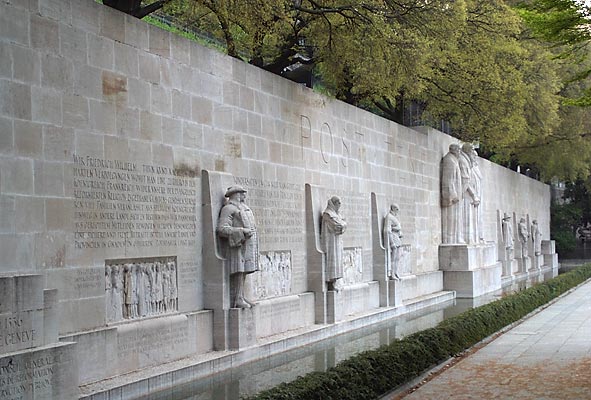
The Reformation broke the rule of the Roman Catholic Church, which dominated and defined Western Christianity for more than 1300 years. Courageous pastors and theologians challenged errors of doctrine and practice that had crept in over the centuries. They wanted to return the Church to pure, primitive Christianity based on the Bible. They criticised practices like prayer to the saints, the celibacy of the clergy, the need for a priest's absolution for the forgiveness of sin, and the huge corruption seen at all levels of the Catholic Church.
They did not all agree, and disputed among each other as well as with Roman Catholics. They faced fierce and brutal opposition, and many died as martyrs. But out of their courageous witness came the Protestant Churches of today, and a recovery of much that was in danger of being forgotten.
Today, October 31, is the date when Martin Luther nailed his 95 Theses to the door of the church in Wittenburg where he lived and taught in 1517. He was not the first Reformer, though: brave Christians before him had challenged the religious establishment, some at the risk of their lives. Here are five of them:
Peter Waldo (c.1140-c.1205)
Waldo or Waldes was the founder of the Waldensians, who still exist today after centuries of persecution. Not much is known of his life, but he is believed to have been a wealthy merchant. He rejected transubstantiation, the view that the bread and wine of communion became the body and blood of Christ in a literal sense, and taugh a doctrine of poverty and simplicity of life. Waldo commissioned the first ever translation of the Bible into a living European language. He and most of his followers fled to inaccessible regions of Italy and France when their doctrines were condemned by Pope Alexander III.
Advertisement
Wessel Harmensz Gansfort (14-19-1489)
Gansfort was a Dutch theologian born in Groningen who protested against the power of the Pope and the superstitions that had grown up around the sacraments. He denied that the Church was infallible in matters of doctrine, or that the Pope was, and denied that indulgences – time off purgatory in return for money – had any spiritual value. Many of his ideas were later taken up by Luther.
John Wycliffe (1320-1384)
Wycliffe was a highly educated man who was Master of Balliol College, Oxford.
In 1374 Wycliffe denounced the sale of indulgences and attacked the Pope. He also attacked the doctrine of transubstantiation. He had a group of followers called the Lollards who went out and preached the simple gospel to ordinary people, and translated the Bible into English. Forty years after his death his bones were dug up and burnt by order of the Church.
John Huss (1369-1414)
John Huss was the Rector of Prague University in Bohemia, now part of the Czech Republic. He read Wycliffe's works and started teaching the Bible in the language of the people. But he was opposed by the Archbishop of Prague and by the Pope, who excommunicated him. Huss criticised the sale of indulgences too, incurring the wrath of the Czech king, who earned a cut of the proceeds.
He was summoned to a Church council, the Council of Constance, and promised safe conduct. But on July 6, 1416, he was burned at the stake, praying: "Lord Jesus, it is for thee that I patiently endure this cruel death. I pray thee to have mercy on my enemies."
Desiderius Erasmus (1466-1536)
The Dutch scholar Erasmus, a great scholar, exposed the Church's moral corruption, writing courageously about the condition of many monasteries. However, is greatest achievement was to edit the first printed Greek New Testament, in 1516. It was a work of great scholarship at a time when many scholars and priests knew only Latin, if that.
Erasmus rejected the doctrine of salvation by faith alone and remained a member of the Roman Catholic Church. Martin Luther said of him: "He pointed out the evil but was unable to point out the good and to lead to the promised land." He was accused of "laying the egg that Luther hatched"; Erasmus replied that Luther had hatched a different bird entirely.
Sponsored
Watch Your Favorite Christian Films, 24/7. Click Here To Start Your Free Trial TodayOriginal Article


